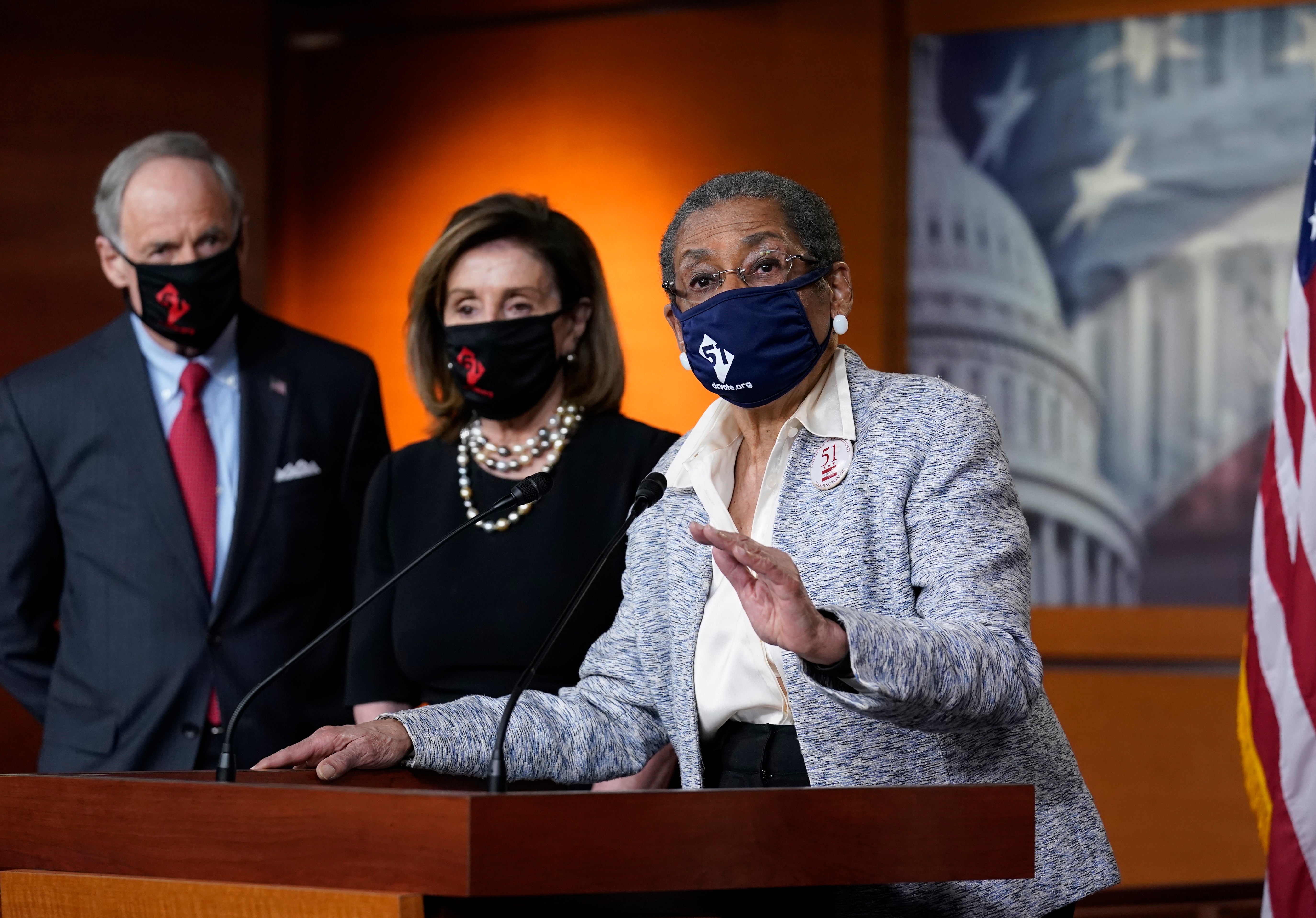DC statehood faces a crossroads with congressional vote
Proponents of statehood for Washington, D

Your support helps us to tell the story
From reproductive rights to climate change to Big Tech, The Independent is on the ground when the story is developing. Whether it's investigating the financials of Elon Musk's pro-Trump PAC or producing our latest documentary, 'The A Word', which shines a light on the American women fighting for reproductive rights, we know how important it is to parse out the facts from the messaging.
At such a critical moment in US history, we need reporters on the ground. Your donation allows us to keep sending journalists to speak to both sides of the story.
The Independent is trusted by Americans across the entire political spectrum. And unlike many other quality news outlets, we choose not to lock Americans out of our reporting and analysis with paywalls. We believe quality journalism should be available to everyone, paid for by those who can afford it.
Your support makes all the difference.Proponents of statehood for Washington D.C., face a milestone moment in their decades-long movement to reshape the American political map.
The House will vote Thursday on legislation that would create the new state of Washington, Douglass Commonwealth, with one representative and two senators. A tiny sliver of land including the White House the U.S. Capitol and the National Mall would remain as a federal district. The measure is expected to pass easily in the House and be sent to the Senate — where the real fight awaits.
For lifelong statehood proponents like Eleanor Holmes Norton Washington's long-serving and nonvoting delegate in the House, the vote will be a culmination of a life's work.
“My service in the Congress has been dedicated to achieving equality for the people I represent, which only statehood can provide," Norton said at a Wednesday news conference. “My life as a third-generation Washingtonian has marched toward this milestone.”
House Speaker Nancy Pelosi, D-Calif., wearing a “D.C. 51” face mask at the news conference, called Norton the “patron saint of D.C. statehood” and predicted the vote would “reaffirm the truth that all deserve a voice in our democracy.”
The measure has received strong support from President Joe Biden’s White House, which released a statement Tuesday calling Washington’s current status “an affront to the democratic values on which our Nation was founded.”
The White House statement praised Washington as worthy of statehood, with “a robust economy, a rich culture, and a diverse population of Americans from all walks of life who are entitled to full and equal participation in our democracy.”
The bill is certain to face strong Republican opposition, given that the proposed 51st state would be overwhelmingly Democratic. An identical statehood bill passed the House in 2020, but it quickly died in the Republican-controlled Senate. Now, with the 2020 elections leaving Democrats in control of both chambers and the White House, Republican senators may resort to a filibuster to stymie the statehood bill.
A March hearing by the House oversight committee provided a preview of the Republican talking points, with a succession of GOP representatives claiming D.C. was unfit for statehood and calling the entire effort a cynical Democratic power play. Opponents proposed a variety of alternatives, from absolving Washingtonians of federal taxes to “retroceding” most of D.C. back into Maryland.
Another major opposition point is the contention that Congress does not have the authority to change D.C.'s status. Although every state other than the original 13 was admitted to the union via congressional vote, statehood opponents argue that D.C. is a special case that requires special steps.
Zack Smith, a legal fellow at the Heritage Institute, a conservative think tank, testified before Congress last month that since D.C.'s creation and limitations are are enshrined in Article I of the Constitution, its status can only be changed through a constitutional amendment. He also argued that D.C. shouldn't be made a state at all and that the Founding Fathers “intended this to be a federal district outside the jurisdiction of any one state.”
If the measure were to become law, Smith predicted a wave of lawsuits that would cloud the new state's actions and any congressional legislation it touched.
“You're basically looking at a lot of litigation,” Smith told The Associated Press. "Every legislative act of this new state would be called into question. ... Things would be in a state of flux for years."
D.C. has long chafed under its relationship with Congress, which has the power to essentially veto or alter any local laws. Its population is larger than that of Wyoming or Vermont and its estimated 712,000 residents pay federal taxes, vote for president and serve in the armed forces, but they have no voting representation in Congress.
The limitations of D.C.'s reality were put in stark relief last summer during a series of angry protests over the death of George Floyd in Minneapolis in police custody and against general police brutality. After a night of widespread vandalism, President Donald Trump usurped D.C. Mayor Muriel Bowser’s authority and called in a massive multiagency federal force to downtown. The law enforcement forces cleared peaceful protesters from a public street so Trump could pose for a photo outside a church.
Ravi Perry, head of Howard University's political science department, said the events of the summer of 2020 were a crucial turning point for the perception of the D.C. statehood push, intertwining the issue with the country's ascendant racial justice movement. As recently as 2018, nationwide polls had shown the majority of Americans to be lukewarm at best on the topic, but those poll numbers changed dramatically in the past two years, he said.
“People have started to see D.C. statehood as the racial justice issue that it is," said Perry, who is also on the board of the pro-statehood group D.C. Vote. “There's been a major sea change and a lot of that has been motivated by Trumpism.”